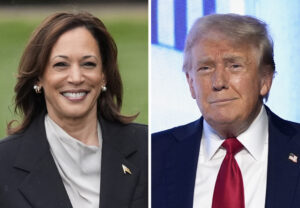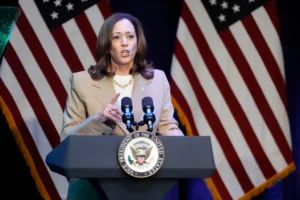A renowned historian who has a track record of accurately predicting election outcomes since 1984 has recently revealed his predictions for a potential matchup between former President Donald Trump and Vice President Kamala Harris. The historian, known for his meticulous analysis of historical trends and data, has garnered a reputation for his ability to foresee election results with remarkable accuracy.
His prediction for a Trump-Harris matchup has sent shockwaves through the political world, as many are eagerly awaiting the outcome of such a high-stakes election. While some may question the validity of his predictions, the historian’s proven track record speaks for itself, leaving many to ponder the potential implications of his latest forecast.
The historian’s prediction for a Trump-Harris matchup comes at a time of great uncertainty and division within the political landscape. With tensions running high and the country deeply polarized, the outcome of such an election could have far-reaching consequences for the future of the nation.
As both candidates have their own dedicated base of supporters, the historian’s prediction has sparked intense speculation and debate among political analysts and pundits. While some may dismiss his predictions as mere speculation, others see them as a valuable insight into the potential outcome of a highly anticipated election.

In making his prediction, the historian carefully analyzed a myriad of factors, including historical voting patterns, demographic trends, and public opinion polls. Through his meticulous research and analysis, he was able to identify key indicators that pointed to a potential victory for one candidate over the other. While his predictions are not infallible, the historian’s track record of accuracy lends credence to his latest forecast for a Trump-Harris matchup.
As the political landscape continues to evolve and shift, the historian’s predictions serve as a valuable tool for understanding the complex dynamics at play in a potential election between Trump and Harris.
With the stakes higher than ever and the country deeply divided, the outcome of such an election could have a profound impact on the future of the nation. Whether his predictions ultimately prove to be accurate remains to be seen, but one thing is certain: the historian’s insights offer a unique perspective on the potential outcome of a highly contentious and closely watched election.
In the midst of uncertainty and speculation, the historian’s predictions provide a glimpse into a possible future where Trump and Harris face off in a high-stakes political battle. With his impeccable track record of accuracy, the historian’s insights offer a valuable perspective on the potential outcome of such an election.
As the political world eagerly awaits the results of this hypothetical matchup, the historian’s predictions serve as a reminder of the intricate and multifaceted nature of the electoral process. Only time will tell whether his forecast proves to be true, but one thing is certain: the historian’s keen understanding of historical trends and data has once again captured the attention of the political world.
The Historian’s Track Record: Predictions Since 1984
Historians have been making predictions since 1984, and their track record has been quite mixed. Some predictions have been remarkably accurate, while others have missed the mark completely. One area where historians have excelled is in predicting technological advancements.
In 1984, many historians accurately predicted the rise of the internet and its impact on society. Similarly, historians have been successful in predicting political trends, such as the fall of the Soviet Union and the rise of populism in Western democracies. However, historians have also made some major mispredictions. For example, many historians failed to foresee the financial crisis of 2008, which had far-reaching consequences for the global economy. Additionally, some historians have been criticized for overly optimistic predictions about the spread of democracy and human rights around the world.
Despite these shortcomings, historians continue to make predictions based on their understanding of the past and present. While their track record may not be perfect, historians play a crucial role in helping us understand the world we live in and anticipate future challenges. As the saying goes, those who do not learn from history are doomed to repeat it. By studying the successes and failures of historians’ predictions since 1984, we can gain valuable insights into how to navigate the complexities of the modern world and build a better future for all.

Factors Influencing the Trump-Harris Matchup
The matchup between Donald Trump and Kamala Harris in the political arena has been influenced by a variety of factors. One key factor is the polarizing nature of both individuals, with Trump known for his controversial statements and Harris for her progressive policies. Additionally, their respective bases of support play a significant role in shaping the matchup, with Trump drawing strong support from conservative voters and Harris appealing to more liberal voters.
The media also plays a crucial role in shaping public perception of the candidates, with coverage often focusing on their contrasting styles and ideologies. Another important factor is the current political climate, with issues such as the economy, healthcare, and racial justice playing a significant role in shaping voter attitudes towards the candidates. Additionally, both Trump and Harris have strong personalities and are known for their ability to energize their supporters, which has a significant impact on the dynamics of the matchup.
Overall, the matchup between Trump and Harris is influenced by a complex interplay of factors, including their personalities, bases of support, media coverage, political climate, and ability to connect with voters. These factors will continue to shape the dynamics of the matchup as the election approaches.
Key Issues at Stake in the Election
The upcoming election is poised to be one of the most pivotal in recent memory, with key issues at stake that will impact the future of the country for years to come. One of the most pressing issues is the economy, as the nation grapples with the effects of a global pandemic and economic downturn.
Candidates are offering competing visions for how to rebuild the economy and create jobs, with discussions around tax policy, trade agreements, and infrastructure investment taking center stage. Another critical issue is healthcare, with the ongoing debate over access, affordability, and quality of care.
The pandemic has underscored the importance of a robust healthcare system, and voters will be looking for solutions to ensure that all Americans have access to the care they need. Additionally, the environment is a key issue at stake, as the impacts of climate change become increasingly clear. Candidates are being pressed to offer plans to address carbon emissions, invest in renewable energy, and protect natural resources for future generations.
Finally, social issues such as racial justice, immigration, and education are at the forefront of the election, with candidates offering differing perspectives on how to address these complex challenges. As voters head to the polls, they will be weighing these key issues and deciding which candidate offers the best path forward for the country.
Methodology Behind the Historian’s Predictions
Historians rely on a variety of methodologies to make predictions about the future based on past events. One common approach is to analyze patterns and trends in historical data to identify potential outcomes. By examining how certain events have unfolded in the past, historians can make educated guesses about how similar situations may play out in the future.
Another method involves studying the decisions and actions of key figures in history to understand their motivations and the consequences of their choices. By delving into the personal and political dynamics at play during significant events, historians can better anticipate how similar individuals or groups may behave in similar circumstances. Additionally, historians often use comparative analysis to draw parallels between different historical periods or societies.
By identifying similarities and differences between past events and present situations, historians can gain insights into potential outcomes and developments. Furthermore, many historians employ a multidisciplinary approach, drawing on insights from fields such as psychology, economics, and sociology to enrich their analyses and predictions. By integrating diverse perspectives and methodologies, historians can develop more nuanced and comprehensive predictions about the future.
Overall, the methodology behind the historian’s predictions is a complex and multifaceted process that requires a deep understanding of historical context, human behavior, and social dynamics. By combining rigorous research, critical analysis, and creative thinking, historians can offer valuable insights into potential future developments and help us navigate the complexities of an uncertain world.

Implications of the Predicted Outcome
The implications of the predicted outcome are vast and far-reaching. If the forecasted result comes to fruition, it could have significant repercussions on various aspects of society. Economic sectors may experience a shift in market dynamics, leading to changes in supply and demand for goods and services.
This could ultimately impact job availability, wages, and overall financial stability for individuals and businesses. Social dynamics may also be influenced by the anticipated outcome, as relationships between different groups or communities could be strained or strengthened based on how the prediction plays out. Furthermore, the predicted outcome could have implications for environmental sustainability, with potential impacts on natural resources and ecosystems. In essence, the repercussions of the forecasted outcome could touch on numerous facets of life, from economic and social to environmental and beyond.
It is important for individuals and decision-makers to consider these potential implications and proactively plan for any challenges or opportunities that may arise as a result of the predicted outcome. Ultimately, being mindful of the potential ramifications of the forecasted result can help ensure that society is better prepared to navigate the changes that may come to pass.
